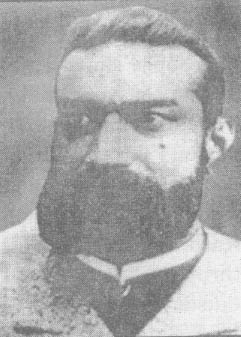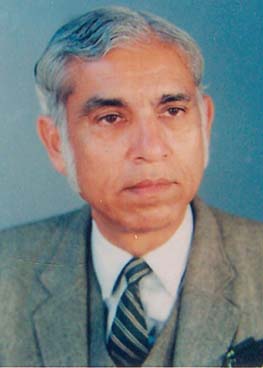Prof. Iqbal Krishna
Sharga was a born Philosopher
By Dr. B.N. Sharga
 Prof. Iqbal Krishna Sharga
was an original thinker and an outstanding philosopher. He elucidated the
Vedantic philosophy in an entirely new perspective correlating it with the
modern thought about the theory of evolution. Prof. Iqbal Krishna Sharga
was an original thinker and an outstanding philosopher. He elucidated the
Vedantic philosophy in an entirely new perspective correlating it with the
modern thought about the theory of evolution.
His ancestor Pt. Zind Ram
Kaul 'Dattatreya' was originally a resident of Rainawari, Srinagar. After taking
refuge at Murree, Rawalpindi and Lahore, Pt. Zind Ram finally landed in Delhi.
Aurangzeb (1658-1707) was the reigning emperor. Pandit Zind Ram was a scholar of
Sanskrit and Persian. He got employment in the Mughal court and started living
in Bazaar Sita Ram. His family too lived here. Not much is known about his son
Sahib Kaul. Pt. Sahib Kaul had two sons-Laxmi Narain Kaul and Niranjan Das Kaul.
The two brothers had received traditional education in Urdu and Persian language
at Delhi. They moved to Oudh during the rule of Nawab Shuja ud Daula
(1753-1775). Faizabad was the seat of the provincial government. Their good
physique helped them to get job in the Shahi Fauj as company commanders of its
mounted division. They were entrusted the security of Nawab's daughter-in-law,
Begum Shamsul Nisa and her Jagir. The Nawab's wife Jenab Bahu Begum
Ammat-uz-Zuhra was very much pleased with Kaul brothers. She granted them a
royal Wasiqa (a sort of hereditary pension) in 1813.
In 1775 Nawab
Asaf-ud-Daula, after the death of his father, Nawab Shuja-ud-Daula, shifted the
seat of government to Lucknow. The Kaul brothers
came to Lucknow alongwith the royal entourage and started living in Rani Katra
Mohalla. This mohalla was founded in 1720 by Rani, the wife of a Hindu Risaldar
Girdhar Nagar during the rule of Mughal emperor, Mohammad Shah. Pt. Laxmi Narain
Kaul and Pt. Niranjan Das Kaul, after receiving the royal recognition in the
form of Wasiqa, started writing Kaul Sharga as their surname.
The elder brother Pt.
Laxmi Narain Kaul Sharga had three sons--Durga Prasad, Sheo Prasad and Prem
Narain. The younger Sharga, Niranjan Das Kaul Sharga had four sons--Narsingh
Dutt, Badri Nath, Kanhaiya Lal and Kedar Nath. He had two daughters--Chando,
married in Mushran family and Meena. Pt. Niranjan Das Kaul Sharga died in 1824.
His third son Pt. Kanhaiya Lal Kaul Sharga had a son-Sheo Krishna.
He was married to Rameshwari (d. 1878).
Prof. Iqbal Krishna Sharga
was born to Sheo Krishna and Rameshwari at Rani Katra in 1861. He received his
education in Urdu and Persian, under the guidance of learned maulvis in a nearby
maktab. He passed his matriculation in 1877 from Govt. Jubilee College and
FA (1879) and BA (1881) from Canning College. This college had been established
by Taluqdars of Oudh in 1862 in a rented building at Aminabad to commemorate the
memory of Lord Canning. This college had affiliation with Calcutta University
that time. There were only three universities then-Calcutta, Bombay
and Madras all established in 1852. Entire north, from Calcutta
to Peshawar was under the jurisdiction of Calcutta University for conducting the
examinations and for awarding the degrees.
In 1883, Prof. Iqbal
Krishna Sharga was appointed Professor of Philosophy in Bareilly College, Bareilly.
A voracious reader and a gifted thinker, Prof. Sharga was extremely popular
among his students. He also authored some books and earned recognition as an
authority on Hindu Philosophy for his innovative ideas and interpretations. He
expounded that in Hindu philosophy everything originated from ‘Om’. This
syllable is indeed Brahma and the highest. Whosoever knows this syllable obtains
all that he desires.
The goals which all the
vedas declare, which all austerities aim at, and which men desire when they lead
a life of contentment is symbolised with this syllable “Om” as per the saying :
Na The Jab Ved Or Brahma
Hua Tab Shabd Onkara
Prof. William knight of
the St. Andrews University, Scotland was much impressed by Prof. IK Sharga's new
interpretations of Vedantic philosophy. While reviewing one of his books, he
wrote, “I rejoice that such teachings are given to the young men who attend the
lectures at
Bareilly. Prof. DG Ritchie, Prof. of Philosophy commented that Prof. Sharga's
book was most admirably written. Though only BA, Prof. Sharga taught students of
MA with ease and great authority. A man with progressive ideas, he always kept
himself update with new ideas. He used to command great respect for his academic
depth.
In 1882 Kashmiri Pandits
organised an annual convention 'National Club' at the historic 'Ganju
Walon Ka Shadikhana' in Kashmiri Mohalla, Lucknow.
The main focus of this convention was to prepare the younger generation mentally
in taking up the European education, so that they did not lag behind in the job
market. Prof. IK Sharga took an active part in the convention. Prominent
Pandits--Ayodhya Nath Kunzru, Shyam Narain Masaldan, Jagat Narain Mulla, Bishan
Narain Dar, Madho Prasad Sharga and Ratan Nath Dhar “Sarashar”, Ganga Prasad
Taimini, Manohar Nath Sapru, Bisheshwar Nath Hangal Sangam Lal Chak, Sri Krishan
Tikku, Bishan Narain Razdan and Brij Narain Gurtu had participated in the
convention.
Dr. Annie Besant came to India in 1893 to
study Vedas. To revive the Vedantic philosophy she formed the Theosophical
Society of India. Pt. Suraj Narain Bahadur, a sub-judge and an educationist
became the secretary of this society. He used to organise its meetings at his
Kashmiri Mohalla residence. Progressive-minded and liberal Pandits of the
locality-Prof. Iqbal Krishna Sharga, Hari Krishna Kaul, Sri Krishna Tikku, Jagat
Narain Mulla, Bishan Narain Dar, Madho Prasad Sharga and Ratan Nath Dar Sarashar
etc. generally used to take part in the deliberations. In this way, Prof. Sharga
came in close contact with Dr. Besant. She was highly impressed by Prof.
Sharga's command over the English language and his knowledge of the Vedantic
philosophy.
Prof. Iqbal K. Sharga
helped and guided Pt. Brij Narain Chakbast to start a library and form Kashmiri
Youngmen's Association in Kashmiri Mohalla in 1905 to prepare young Kashmiri
Pandit boys to face the challenges of life with grit and determination.
At the initiative of Dr.
Besant, Sri Pratap
Singh Hindu School was established in 1898 at Sathu Barbar Shah, Srinagar.
It was housed in a rented house. This later became SP College. The college was
founded in 1905 as an intermediate college, managed by the Central Hindu College
Trust, Benaras. Its first principal was Professor MU Moore, a reputed Irish
scholar and a graduate of the Cambridge University,
London. He functioned as Principal till 1908. Prof. E. William Collie, who
succeeded him died in the same year in a fire accident in a house-boat in which
he was staying. Prof. Vinamali Chakraborty was then appointed as the first
Indian Principal of SP College. He could not function due to certain reasons.
In 1909 Professor IK
Sharga and a fellow Kashmiri from Kashmiri Mohalla, Pt. Chand Narain Bahadur had
just gone to
Kashmir for sight-seeing. Professor Sharga was appointed as the first Indian and
Kashmiri Principal of the College. Pt. Chand Narain Bahadur became the Professor
of English in the same institution. Prof. Sharga joined the select band of those
old Kashmiris who got chance to serve the land of their forefathers. They
included - Har Sahai Bahadur and his grandson CN Bahadur, Raja Suraj Kaul and
his son Daya Krishan Kaul, Dr RN Haksar, Sri Ram Taimni, Brij Lal Nehru, Shiv
Narain Bhan, Brij Mohan Dattatreya, Avtar Krishan Wattal, Praduman Krishna
Kitchlu etc. These Kashmiris were close confidants of Maharaja Pratap Singh.
Professor IK Sharga, due to his awe-inspiring personality and deep knowledge
about his subject, became quite popular among his students. They held him in
great respect.
Professor Sharga used to
live near Residency Road, besides a famous bakery shop owned by a Parsi fellow,
nicknamed as Odu. He was fond of wearing the European dress and was a reserved
person by temperament. He was a strict disciplinarian and never indulge in loose
talks. He excelled in Chess and Bridge playing and was a connoisseur of Urdu and
Persian poetry. His untiring efforts helped SP College become a Degree College in 1911.
Initially, it was affiliated to Benaras Hindu
University. The British government was alarmed over the influence, Dr Besant
wielded in the Valley. It prevailed upon the state government to take over the
college. In 1912 it was affiliated to Punjab University, Lahore and the word
Hindu was dropped.
It was during the tenure
of Professor IK Sharga that science classes were introduced up to the
intermediate level in this institution. He also started the tradition of
celebrating the spring festival in the college premises on a grand scale every
year. Professor Sharga not only toned up the administration, but also tried his
best to maintain high academic standards. Due to his efforts MA classes were
started in the College in 1917. Professor Sharga hated sycophancy. His work was
not appreciated by Dr A Mitra, a Bengali, who was then minister of Higher
Education. To bring about understanding between the Hindu and Muslim students,
Professor Sharga started a common tea club for them and used to subsidise it. To
encourage the meritorious students he used to give them prizes and awards from
his own pocket. He also used to give the financial aid to widows and orphans
from his income. To improve the over all performance of the students, he
introduced the monthly examination system in the college to assess their
knowledge. He used to organise debates and lectures of the eminent people in the
college regularly to broaden the outlook of his students.
As Principal of the
prestigious college, Professor Sharga was well-known among the elite of the
town. He also developed a good rapport with Mr. Neidou, the owner of the
Neidou's Hotel in
Srinagar. Prof. Sharga due to his intake of Tobacco and beetle leaves, developed
throat cancer and died at Varanasi in 1925 at the age of 64.
Professor IK Sharga was
married to Jai Kishori (Iqbal Rani) D/o Kedar Nath Muttoo of Khetgali, Rani
Katra, in 1874. He had one son, Hari Krishna Sharga and a daughter Raj Dulari.
The latter was married to Dr. Roop Narain Haksar (son of Dewan Swaroop Narain
Haksar of Indore
state), personal physician to Maharaja Pratap Singh of J&K. Dr Haksar died
young, while his wife committed suicide by jumping into a well. The couple had
three sons--Shyam Sunder Haksar, Ram Chandra and Mahendra.
Pt. Hari Krishna Sharga
was employed in the education department in UP and lived at Kamachcha in Varanasi. He was married
to Krishna Dulari D/o Ram Narayan Channa of Kashmir.
They had three daughters - Lalita, Kamla and Girja. Lalita was married to Chand
Narain Haksar and Kamla to Madan Mohan Lal Kitchlu S/o Kishori Lal Kitchlu, a
sub-judge in Jammu.
Girja was married to Shyam Sunder Padru.
| 








 Prof. Iqbal Krishna Sharga
was an original thinker and an outstanding philosopher. He elucidated the
Vedantic philosophy in an entirely new perspective correlating it with the
modern thought about the theory of evolution.
Prof. Iqbal Krishna Sharga
was an original thinker and an outstanding philosopher. He elucidated the
Vedantic philosophy in an entirely new perspective correlating it with the
modern thought about the theory of evolution.




No one has commented yet. Be the first!